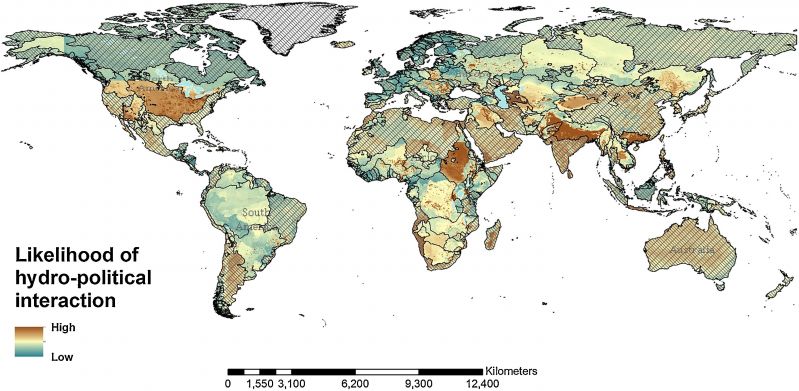Global Hotspots for Potential Water Disputes - European Commission Report
Published on by Water Network Research, Official research team of The Water Network in Government
JRC scientists have identified the hotspots where competition over the use of shared water resources could lead to disagreements between countries.
The new study aims to facilitate the implementation of strategies to encourage cooperation between countries.
The combination of climate change and demographic growth is likely to exacerbate hydro-political issues
Water conflicts are more likely to occur in areas that are already under water stress
The most vulnerable areas are around the Nile, Ganges-Brahmaputra, Indus, Tigris-Euphrates, and Colorado rivers
Competition for limited water resources will be one of the main concerns in the coming decades.
Scarce water resources can generate or exacerbate political tensions, regional instability and social unrest.

Likelihood of hydro-political issues in the main transboundary basins ©European Union 2018
New scientific methods for early identification of risk areas
JRC scientists used a new machine-learning approach to investigate the pre-conditions and factors that are likely to lead to water management issues in shared water bodies.
They carried out an innovative analysis of past episodes of conflict and cooperation over transboundary water resources, and studied the links with freshwater availability, climate stress, human pressure on water resources and socio-economic conditions.
"The scope of our study is two-fold. First, we wanted to highlight the factors which lead to either political cooperation or tensions in transboundary river basins. And second, we wanted to map and monitor the likelihood of these kinds of interactions over space and time and under changing socio-economic conditions", explains JRC researcher and lead author of the study, Fabio Farinosi.
Determining factors
Scarcity of water, high population density, power imbalances and climatic stressors are the main factors which push countries towards either political cooperation or tensions in transboundary river basins.
The Nile, Ganges-Brahmaputra, Indus, Tigris-Euphrates and Colorado rivers are "water hotspots", where "hydro-political interactions" are most likely to occur.
These areas are already under water stress, and future demographic and climatic conditions are expected to exert further pressure on scarce water resources.
The changing socio-economic and climatic factors will increase the pressure on water resources worldwide.
This is likely to increase competition between countries for water.
Globally, the combined effect of climate change and population growth can increase the likelihood of water-related interactions in transboundary river basins by between 74.9% and 95%.
"This does not mean that each case will result in a conflict. It depends on how well prepared and equipped the countries are to cooperate. This is where we hope our research can help, by raising awareness of the risks so that solutions can be sought early on", Farinosi says.
New tools for monitoring hydro-political dynamics
Based on this research, JRC scientists developed an index and a model which help detect areas in the world that are at high risk of hydro-political conflicts.
These tools can prompt policymakers to design and implement strategies that encourage cooperation between countries before conflicts occur.
The tools also provide an additional method for monitoring the hydro-political dynamics under Target 6.5 of the Sustainable Development Goals (SDGs), which aims to enhance Water Resources Management and transboundary cooperation.
The index and model complement the SDG indicator "6.5.2 Proportion of transboundary basin area with an operational arrangement for water cooperation", by providing additional intelligence on important contributing factors that are not yet included in the current SDG monitoring framework.
The JRC is in the process of developing a more detailed analysis of the largest river basins in Africa in collaboration with the local institutions.
EU action
This study, which builds on the 2013 Council Conclusions on EU water diplomacy, will further inform the EU's work on water diplomacy and transboundary water management.
The EU is engaged in contributing to peace and security in priority regions such as the Nile basin, the Central Asia region and the Mekrou River Basin, with a number of projects aimed at developing mechanisms for cooperative and knowledge based water management in order to avoid conflicts, and to sustain common water resources for sustainable development.
In 2018, the EU worked to promote global membership to the UNECE Water Convention.
The aim was to underscore the EU's belief in the shared value of international agreements on global water cooperation in order to foster development and peace in a context of increasing tensions over water.
Chad has been the first non UNECE country to join the UNECE Water Convention, and Senegal has followed.
Other African countries are also taking steps towards accession to this international legal instrument which promotes international water governance.
The EU is ready to support interested countries in the accession process.
Read the full study: An innovative approach to the assessment of hydro-political risk: A spatially explicit, data driven indicator of hydro-political issues
Source: European Commision
Media
Taxonomy
- Policy
- Governance
- Environmental Policy
- Water Cooperation & Conflict
- Governance & Policy
- Governance & Planning
- Institutional Development & Water Governance
- Conflict Management
- Dispute Resolution
1 Comment
-
Another amazing view of the use of machine learning in water resources management. But we just need to shift from focusing on the conflicts and look towards the positive interactions that exist.
Water as a tool of peace rather than conflict.